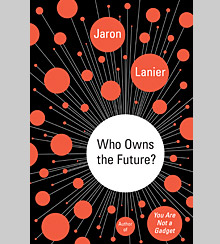Share the Digital Wealth
George Dyson, author of Turing’s Cathedral: The Origins of the Digital Universe, introduces a passage arguing for a more equitable distribution of the wealth created on the Internet from Who Owns the Future? by Jaron Lanier.
Revolutions have a way of disappointing their creators. Just ask Marx. The digital revolution is no different, and Jaron Lanier is here to remind us of that. The Internet, after promising to decentralize everything, has enabled the greatest consolidation of wealth, power, and territory since the Mongol Empire.
Apple, Amazon, Facebook, and Google—the four “Siren Servers” of the apocalypse—are dividing the world among themselves, leaving the rest of us with the crumbs. Apple, after exhorting us to “think different,” is building a future where we all must think alike. Amazon isn’t just the mall to end all malls—it’s the corner store to end all corner stores. Facebook is ruthlessly monetizing the social graph. Google is tracking and selling our every move.
This sounds depressing. And it gets worse. Lanier argues that the digital economy is at risk of killing the goose that laid the golden egg—us. The personal computer, once the machine for the masses, has, through the agency of the Internet, begun to eviscerate the middle class.
Now the good news. Lanier also offers some prescriptive advice, and the upstarts that follow it may well triumph over the dinosaurs that don’t. His advice is simple: In addition to collecting tribute (in monetizable data and individual creativity) from the serfs toiling at the bottom of the digital economy, pay some of it back. Lanier doesn’t just mean paying corporate taxes (Apple’s scandal hit after his book went to press); he means, for instance, applying the same prowess with algorithms that allows Google to auction individual words for advertising purposes to reward individual authors for writing them.
“The automata were chiefly used for advertising,” warned Samuel Butler in his notes for Erewhon Revisited, returning to the technological dystopia he first imagined in 1872. We were warned then, and we are being warned now. The stakes are high, and rising fast.
—George Dyson
An excerpt from chapter 22 of Who Owns the Future? by Jaron Lanier
The employment picture is increasingly “hollowed out” in physicality. People increasingly find their sustenance in dead-end jobs at the bottom, or in elite jobs at the top.
To me that means our economy is obsolete and needs to be reformed to keep up with technological progress. But to others it means that people are becoming obsolete.… I hear this infuriating comment all the time: “If a lot of ordinary people aren’t earning much in today’s markets, that means they have little of value to offer. You can’t intervene to create the illusion that they’re valuable. It’s up to people to make themselves valuable.”
Well yes, I agree. I don’t advocate making up fake jobs to create the illusion that people are employed. That would be demeaning and a magnet for fraud and corruption.
But network-oriented companies routinely raise huge amounts of money based precisely on placing a value on what ordinary people do online. It’s not that the market is saying ordinary people aren’t valuable online; it’s that most people have been repositioned out of the loop of their own commercial value.
A dismissive smirk often greets proposals for a humanistic information economy. How could nongenius, ordinary people have anything valuable to offer in a world dominated by elite technical people and advanced machines?
This reaction is understandable, since we have become used to seeing the underemployed languish. But there are occasions when this kind of doubt in the value of others betrays gross prejudices.
One example is when investors are perfectly confident to value a Siren Server that accumulates data about people in the tens of billions of dollars, no matter how remote the possibility of an actual business plan that would make a commensurate amount of profit. And yet, at the same time, these same investors can’t imagine that the people who are the sole sources of what is so valuable can have any value.
And then there are ideological pundits from the sidelines who strike out at anyone who points out the absurdities of what we’re up to in Silicon Valley lately. If someone complains that all those brilliant recent PhDs ought to perhaps be working on something more substantive than putting yet more paid links in front of people, you can expect a rigorous defense of the nonmonetary value being created by today’s cloud computing. Twitter doesn’t yet know how to make much money, for instance, but it is defended this way: “Look at all the value it is creating off the books by connecting people better!”
Yes, let’s look at that value. It is real, and if we want to have a growing information-based economy, that real value ought to be part of our economy. Why is it suddenly a service to capitalism to keep more and more value off the books?
Why must it be the case that from the perspective of the Siren Server, knowing what ordinary people do is breathtakingly valuable, while from a personal perspective, exactly the same data usually earns only transient crumbs in the form of easier-to-find couches to crash on and lightweight ego boosts?
Or to put it another way, once industries like transportation, energy, and health care start to become software-mediated, shouldn’t the communication and entertainment industries become relatively more important to the economy, to take up the slack? And yet these are precisely the industries that software has sapped so far.
Whenever one sort of task can be automated, others that can’t be automated come into view. The economic question is who gets paid for what people at ground level do beyond the horizon of automation in a given historical phase.
As long as the people who actually do whatever it is that can’t be automated are paid for what they do, an honest human economy will persist. If third parties who run the biggest network computers are the ones who are paid, then there will no longer be an honest economy.
So will people in a humanistic economy find enough value in each other to earn a living, once cloud software coupled with robots and other gadgets can meet most of life’s needs and wants? Or even more bluntly, “Will there be enough value from ordinary people in the long term to justify the existence of an economy?”
In order to answer, we can start with familiar ideas about what people can do for Siren Servers, and change the question ever so slightly to be about what people can do for themselves and each other. At least two answers are immediately apparent.
One manifest answer is that people are infinitely interested in what other people express online. Huge numbers of people find audiences for their tweets, blogs, social network updates, Wikipedia article tweaks, YouTube videos, snapshots, image collections, meanderings, and from second-order reactions and mash-ups of all of the above. Is it really such a flight of fancy to predict that a large number of people will still be offering this type of value online, so long as the accounting is complete and honest, into the foreseeable future?
Now is when I expect to hear that this kind of activity is all fluff and not the stuff of an economy. Once again, why is it fluff if it’s for the benefit of the people who do it, while it’s real value if it’s for the benefit of a distant central server?
Economics is not about your taste. Economics, once people have risen above basic needs into the middle class, is about the tastes of other people, whether you like it or not.
It’s hard to say how much of the present-day economy is based on taste instead of need, since, as Abraham Maslow pointed out, the line shifts. At the very least, not only entertainment, but titanic industries like cosmetics, sports and recreation, tourism, design, fashion, hospitality, dining, hobbies, grooming, cosmetic surgery, and the majority of the activities of geekdom ought to count as “tastes” that have turned into needs as far as commerce is concerned.
All of these industries, whether they are construed as answering wants or needs, would remain monetizable in the terms of humanistic computation no matter how advanced technology gets. When home robots make other home robots that sew dresses from designs found online, then either the fashion business will be demonetized or not, depending on whether the accounting is complete. In a humanistic information economy, accounting will be complete, and people will continue to make their livings as fashion designers, fashion photographers, and fashion models, and will achieve dignity.
In a humanistic digital economy, the economy will be more ambient, and designers will still make a living, even when a dress is sewn in a home by a robot. Someone who wears the dress well might also make a little money inadvertently by popularizing it.
There will also presumably be new wants/needs appearing on the horizon into the future without end. Who can say what they will be? In addition to recipes to be mixed by artificial glands, there might be genetic modifications to make space travel more enjoyable, or neural patterns to excite special capabilities in your brain, such as an increased aptitude for math.
Whatever may come, if the control of it can be transmitted on a network as information, then there will be a choice about whether to monetize that information. Even if the idea of money becomes obsolete, the choice will remain of whether the distribution of clout and influence will be centralized or proximate to the people who are the origin of value. That choice will remain the same no matter which science fiction technologies come about.
If the answering of wants or needs is to be instead demonetized except for the central, all-seeing Siren Server, then both capitalism and democracy will gradually grind to a halt with the advancement of digital technology.
Excerpted with permission of Simon & Schuster, a division of Simon & Schuster Inc. Copyright © 2013 by Jaron Lanier.



